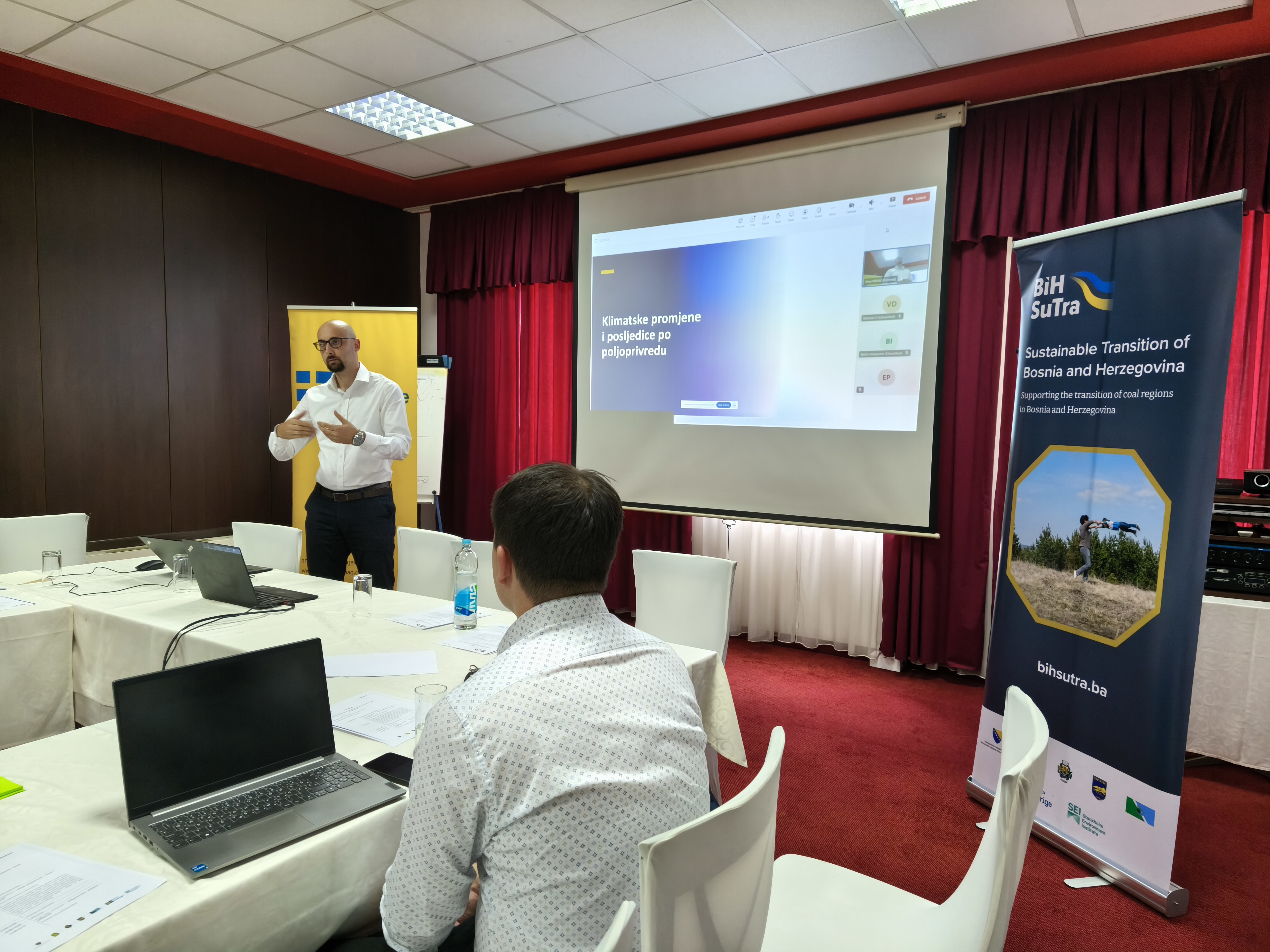 Photo: BiH SuTra team
Photo: BiH SuTra team
 Photo: BiH SuTra team
Photo: BiH SuTra team
Can agriculture be smart, green, and good for the planet? That was the question explored at the workshop held in Ugljevik, where experts and municipal representatives came together to discuss the future of sustainable agriculture in Bosnia and Herzegovina. The workshop, held on 17 June, focused on strengthening the capacities of local self-government units (LSGs) in this field - helping them grow their knowledge, share experiences, and explore new ideas. And it certainly delivered plenty of food for thought.
The day began with insightful presentations by Prof. Dr. Sabrija Čadro and MA Samir Husić, who provided a clear and grounded overview of the agricultural landscape in Bosnia and Herzegovina. While the sector plays an important role, contributing 4.8% to the national GDP and employing around 84 000 people, it also faces some serious hurdles. From fragmented land ownership and increasing droughts and floods, to soil degradation and a lack of coordinated support, the challenges are many. The experts pointed to key gaps, such as limited access to EU and IPARD funds, weak collaboration between government levels, and outdated irrigation systems. But the message was constructive: with smarter coordination, stronger farmer networks, and modern infrastructure, there’s a real opportunity to turn things around.

In the second session, Jonna Wiklund from the Stockholm Environment Institute (SEI) offered a valuable look into how the European Union is shaping the future of farming. She introduced participants to key EU strategies like the Green Deal, Common Agricultural Policy (CAP), and Farm to Fork, with a closer look at how these are being put into practice in Sweden. Concrete examples included support for carbon sequestration, cover cropping, and precision nutrient management—practical tools for building more resilient and eco-friendly farms. A special focus was placed on the importance of advisory services, which play a key role in helping farmers cut through red tape, understand available options, and take full advantage of support programs.
The final session brought a dose of real-world inspiration from Sweden. Dr. Ivar Virgin from SEI shared the story of Ova Växt AB, a forward-thinking farm that’s leading the way in precision agriculture. Using smart technologies like GPS-guided tractors, nitrogen sensors, and controlled traffic systems, the farm has found ways to improve productivity while caring for the environment. What stood out even more was its circular economy model, which connects the farm with bioenergy plants, local food systems, and biogas production—creating a system that’s not only sustainable, but also more resilient to market shocks. Of course, challenges remain, including the high costs of innovation and the constant need to stay ahead of the curve - but the example offered a powerful look at what the future of farming can look like.
.png)
The workshop concluded with a shared recognition that Bosnia and Herzegovina holds considerable potential for developing sustainable and climate-resilient agriculture. Unlocking this potential will require a combination of policy alignment, institutional strengthening, digitalization, and the adoption of modern agricultural technologies. The Swedish experience offers a valuable reference point for the design and implementation of pilot projects in BiH, while greater support for advisory services and farmer education will be essential to ensure the effective uptake of future initiatives.
The workshop wrapped up on a hopeful and forward-looking note. There was a shared sense that Bosnia and Herzegovina has strong potential to grow a more sustainable and climate-resilient agriculture sector. Realizing that potential won’t happen overnight - it will take better policy coordination, stronger institutions, more digital tools, and the adoption of modern technologies on the ground. But the good news is that the Swedish experience offers a practical and inspiring roadmap. With the right support. especially in advisory services and farmer education, BiH is well-positioned to take meaningful steps toward greener, smarter farming.
Discover the News and Updates section, delivering the latest updates and insightful content across various topics. Stay informed with most recent news articles, reports, and publications, of the BiH SuTra project.